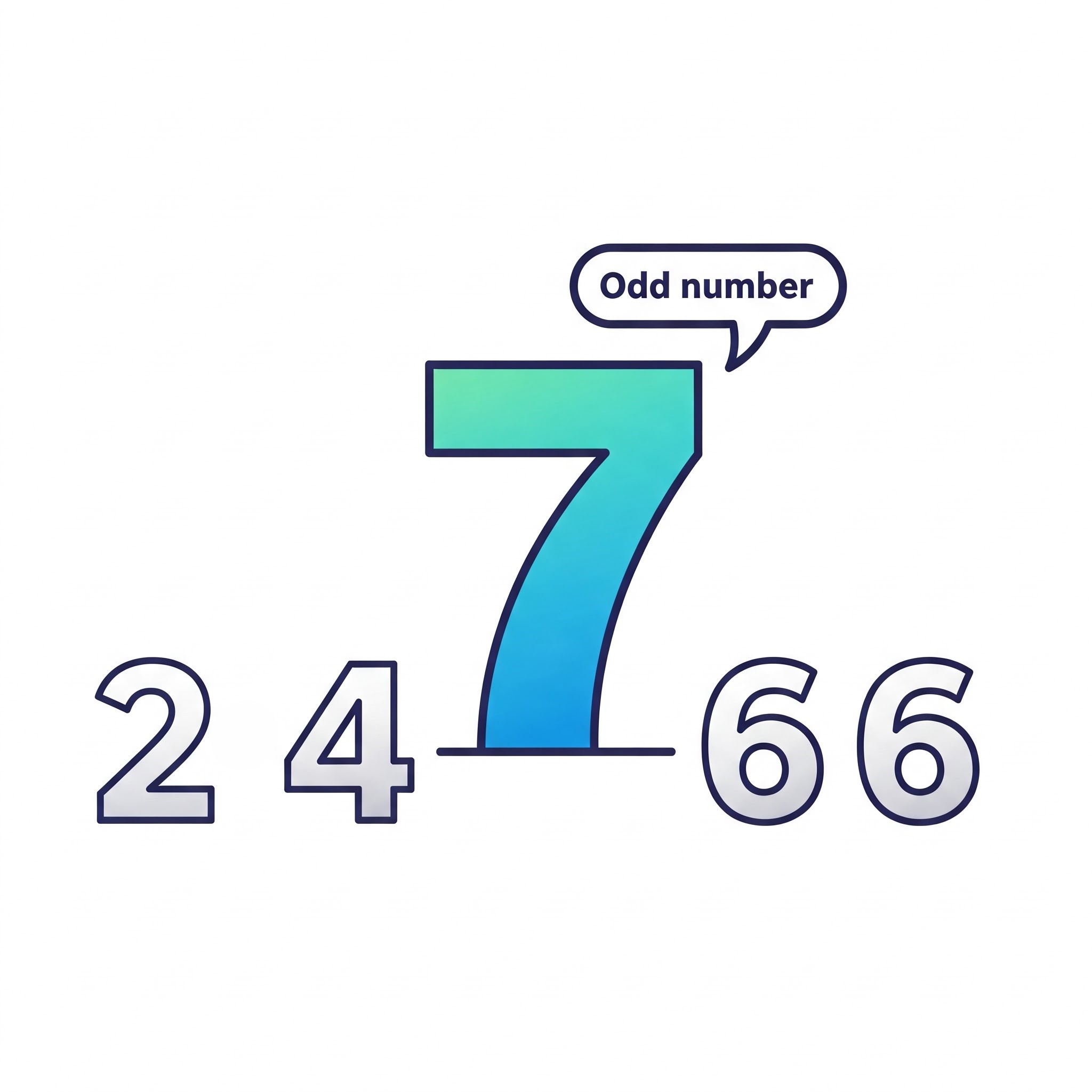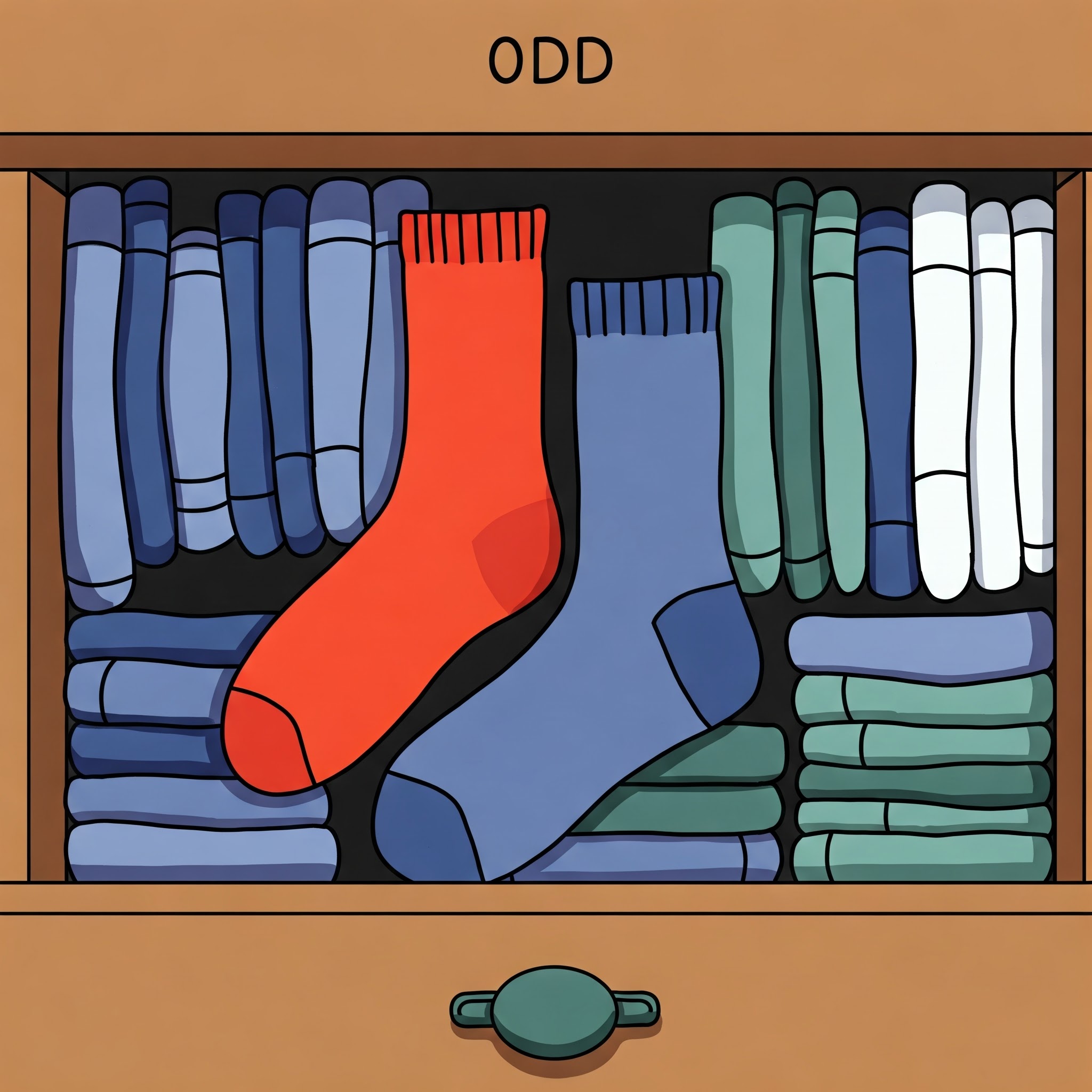Odd
Definition
Odd is an adjective and noun that describes something unusual, strange, or out of the ordinary. It can also refer to numbers that are not divisible by two or something that does not conform to a pattern.
Parts of Speech
- Adjective
- Noun (rare, informal)
Pronunciation
American English
- IPA Pronunciation: /ɑːd/
- Respelling: awd
British English
- IPA Pronunciation: /ɒd/
- Respelling: od
Etymology
The word "odd" originates from Old Norse "oddi," meaning "point of land" or "triangle," later evolving to mean "one left over" or "uneven." It entered Middle English as "odde," signifying something irregular, strange, or not conforming to a pair.
Derivatives
- Oddly (adverb)
- Oddness (noun)
- Odds (noun, plural)
- Oddball (noun, informal)
- Oddment (noun)
Synonyms
- Strange
- Unusual
- Peculiar
Antonyms
- Normal
- Common
- Even
Usage
As an adjective, "odd" is often used to describe something strange or unexpected. For example, "He had an odd habit of collecting bottle caps."
It is also used to refer to numbers not divisible by two. For example, "Three is an odd number."
Related Terms
- Even: The opposite of odd, referring to numbers divisible by two.
- Unusual: Something uncommon or atypical.
- Irregular: Something not following a fixed pattern.
Detailed Definitions
Adjective
- Unusual or strange: Used to describe something that deviates from the norm.
- Example: "His behavior seemed odd that evening."
- Not divisible by two: Refers to numbers that cannot be evenly divided by two.
- Example: "Seven is an odd number."
- Not fitting into a set or pair: Describes something left over or not in an expected arrangement.
- Example: "He found an odd sock in his drawer."
- Approximately or roughly: Used after numbers to indicate an estimated amount.
- Example: "There were fifty-odd people at the party."
Noun (rare, informal)
- A person who is strange or eccentric: Used in informal speech.
- Example: "He’s a bit of an odd, but he means well."
odd



🇨🇳 Mandarin
- 奇怪的 (Qíguài de) - strange
- IPA: /t͡ɕʰi˧˥ kwai˥˩ tə/
- English respelling: chee-gwhy duh
- 奇数的 (Qíshù de) - odd number
- IPA: /t͡ɕʰi˧˥ ʂu˨˩˦ tə/
- English respelling: chee-shoo duh
🇮🇳 Hindi
- अजीब (Ajīb) - strange
- IPA: /ədʒiːb/
- English respelling: ajeeb
- विषम (Visham) - odd number
- IPA: /ʋɪʂm/
- English respelling: visham
🇪🇸 Spanish
- Extraño - strange
- IPA: /eksˈtɾaɲo/
- English respelling: eks-tran-yo
- Impar - odd number
- IPA: /imˈpar/
- English respelling: im-par
🇫🇷 French
- Étrange - strange
- IPA: /e.tʁɑ̃ʒ/
- English respelling: eh-trahnzh
- Impair - odd number
- IPA: /ɛ̃.pɛʁ/
- English respelling: anh-pair
🇸🇦 Modern Standard Arabic
- غريب (ghareeb) - strange
- IPA: /ʁa.rib/
- English respelling: gha-reeb
- فردي (fareedy) - odd number
- IPA: /far.diː/
- English respelling: far-dee
🇧🇩 Bengali
- অদ্ভুত (Odbhut) - strange
- IPA: /ɔdbʱut/
- English respelling: od-bhoot
- বিজোড় (Bijor) - odd number
- IPA: /bid͡ʒor/
- English respelling: bijor
🇷🇺 Russian
- Странный (Strannyj) - strange
- IPA: /ˈstranːɨj/
- English respelling: stran-nyj
- Нечётный (Nechotnyy) - odd number
- IPA: /nʲɪˈtɕotnɨj/
- English respelling: ne-chot-niy
🇵🇹 Portuguese
- Estranho - strange
- IPA: /eʃˈtɾɐ̃ɲu/
- English respelling: esh-tran-yoo
- Ímpar - odd number
- IPA: /ˈĩ.paɾ/
- English respelling: eem-par
🇮🇩 Indonesian
- Aneh - strange
- IPA: /aˈnɛh/
- English respelling: a-neh
- Ganjil - odd number
- IPA: /ˈgan.d͡ʒil/
- English respelling: gan-jil
🇩🇪 German
- Seltsam - strange
- IPA: /ˈzɛltzam/
- English respelling: zeltsam
- Ungerade - odd number
- IPA: /ˈʊŋɡəˌʀaːdə/
- English respelling: oong-gera-deh
🇯🇵 Japanese
- 奇妙な (Kimyō na) - strange
- IPA: /kimjoː na/
- English respelling: kee-myo na
- 奇数の (Kisū no) - odd number
- IPA: /kisɯː no/
- English respelling: kee-soo no
🇻🇳 Vietnamese
- Kỳ lạ - strange
- IPA: /kɨ˧˩ la˧˧/
- English respelling: kee lah
- Lẻ - odd number
- IPA: /le˧ˀ˨ʔ/
- English respelling: leh
🇰🇷 Korean
- 이상한 (isanghan) - strange
- IPA: /i.saŋ.han/
- English respelling: ee-sang-han
- 홀수의 (holsuui) - odd number
- IPA: /hol.s͈u.i/
- English respelling: hohl-soo-ee
🇹🇷 Turkish
- Tuhaf - strange
- IPA: /tuˈhaf/
- English respelling: too-haf
- Tek - odd number
- IPA: /tek/
- English respelling: tek
🇵🇰 Urdu
- عجیب (Ajeeb) - strange
- IPA: /ədʒiːb/
- English respelling: ajeeb
- طاق (Ta'aq) - odd number
- IPA: /t̪aːq/
- English respelling: ta-ak





